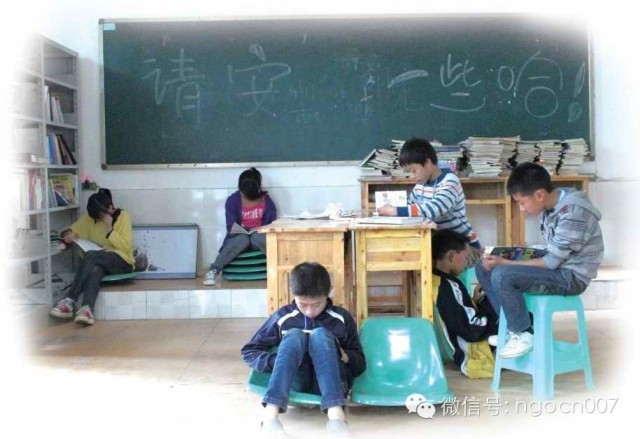China's rural areas don't receive the same education resources that the country's wealthier urban centers do. This gap is a widely acknowledged problem, and many organizations have been established to improve the facilities in rural China and ensure that the students there aren't left behind.
However, Chinese authorities don't exactly welcome citizen-led initiatives with open arms, and recently an independent library project called China Rural Library (CRL) was forced to close due to political pressure.
CRL announced the closure of its library project on Sept. 18, 2014, on popular microblogging website Sina Weibo and published an open letter explaining the pressure they faced. The letter went viral on Chinese social media and was later censored by the authorities. Independent news website China Digital Times published a copy of the letter on Google Plus.
The letter revealed that the Ministry of Culture, the Ministry of Education and the Police Security Bureau started imposing pressure on CRL's library project since June this year. In some cases, the authorities raid the libraries of books that discuss religion. For example, the sociology classic, The Protestant Ethic and the Spirit of Capitalism, by Max Weber was confiscated. Their online volunteer recruitment platform and souvenir shop were also forced to shut down. By September, 19 libraries across the countries were forced to shut down. CRL stressed that “none of its libraries are voluntarily closed for mismanagement reasons”.
Established in 2007, CRL's mission is to “help rural teenagers grow into healthy, normal modern citizens ” by providing free access to books. During the past seven years, it has partnered with local schools and government-owned libraries and set up 22 libraries across 11 provinces in China. The project is supported by donations and volunteer support.
The founder of CRL, Li Yingqiang, received his master degree in economics from Peking University and wished to boost literacy and education through public libraries after having witnessed a lack of quality education in rural China.
There is speculation that foreign donations and Li Yingqiang’s Christian beliefs might have upset authorities. But Li Yingqiang clarified that while the organization received a total of 15,000 euros in small grants from a German foundation, that foundation was founded by a Chinese living overseas, and all the donations are from Chinese citizens and organizations. In 2013, Li left his position as the chief executive of CRL and also resigned as director at the end of 2014.
Since CRL is a non-political and non-religious charity group, the nationwide crackdown on its libraries attracted many online comments. A former volunteer from CRL offered an explanation of its closure on Zhihu, a question and answer platform:
立人的一个问题就是步子走得太快了。原本意义上来说无论是立人乡村图书馆还是大朋友计划还是燃灯者计划还是乡村女生计划都没错,但是在图书馆本身根基并不稳的情况下搞了一个立人大学这本身在我看来就是很作死的行为。立大无论从哪个方面来说右这个字暴露无疑。
CRL’s real problem is that it developed too fast. While most of its projects, including the public libraries, elderly friends [a mentor project], torch and rural school girl projects are still in their infancy, the bold act of launching the Liren University [a summer camp project which was forced to be cancelled] brought the organization down.
As education is a major battlefield for the ideological struggle against western universal values like “citizen right”, any education initiatives which are outside the direct control of the Chinese Communist Party is forbidden.
Weibo user and a former supporter of CRL, “Pursuing empty dream” (@空空追梦), believed the shutdown was a result of management problems rather than political pressure:
出了这么大的事。一个本是消极自由的象征的图书馆成了出头鸟,管理层不去反思,自省。一味的用要对NGO动手,是因为“公民”,为了维持愚民政策等大而无当,没有根据的言辞推脱责任、躲避指责,这才是最令我伤心的地方。所以作为知名立人之友,在这个关头,我要泼冷水,敲丧钟,煽风点火。
Such a big mess. The library project, which was originally a passive symbol of freedom, had become the clamp-down project. Instead of reflecting on what's gone wrong, the management kept talking about NGO principles and “citizens” and blaming the authorities’ policy. It is disheartening to see people not taking responsibility. As a friend of Liren, I have to pour cold water, ring the funeral bell and light up the fire at this critical moment.
Popular Weibo user, “the myth of social work” (@社工迷思), believed the problem was rooted in the relationship between government administration and NGOs:
多家立人图书馆被关一事让人反思和质疑当下“社会组织大发展”的泡沫形式,行政干预公益是当前ngo面临的巨大挑战,它直接影响着公益慈善和社会组织发展是否正常及健康。
The closure of Liren libraries forced us to reflect upon the bubbles of “the big development of social organization”. Administrative intervention is the biggest challenge an NGO faces today. It determines whether the philanthropy and civil organizations can grow healthily in China.
Taiwanese Professor Shih-Hung Lo, who studied the development of civil society in mainland China, wrote on his blog:
在當下的中國大陸,從事民間公益活動已經變成為危險事業,任何自主的民間公益活動,哪怕再怎麼遠離政治,都隨時可能引來當局的粗暴鎮壓。立人鄉村圖書館被關閉的不幸事件,不僅對中國大陸的總體社會發展狀況發出了令人不安的訊號,也將使更多人對漸進改革失去最後一絲希望。
On China’s mainland, philanthropy and civil society have become dangerous professions. No matter how hard they try to shy away from politics, there could be the target of a crackdown by authorities. The closure of China's rural libraries is an unsettling signal of current condition of society on the mainland, destroying the last hope of those who want gradual reform in China.








4 comments